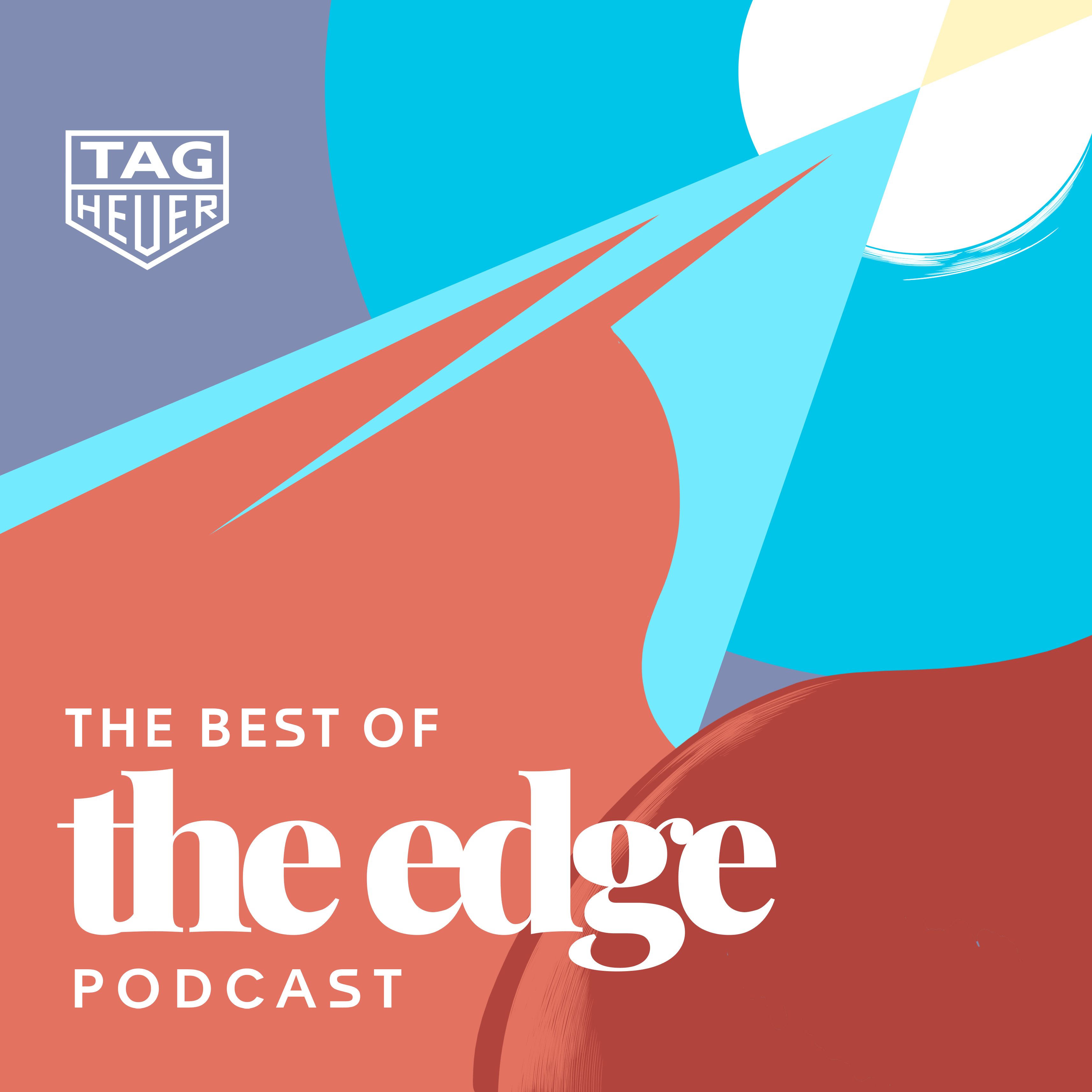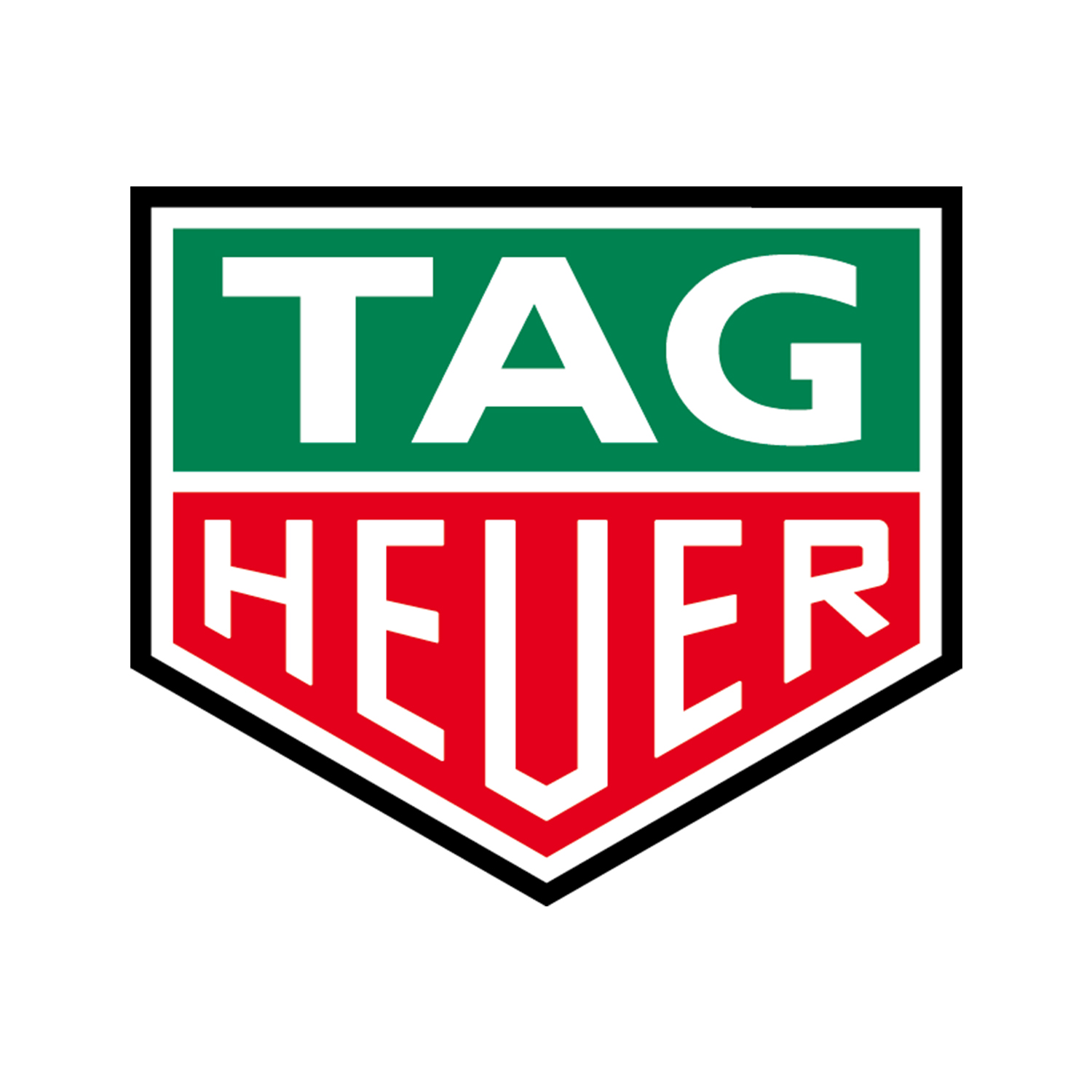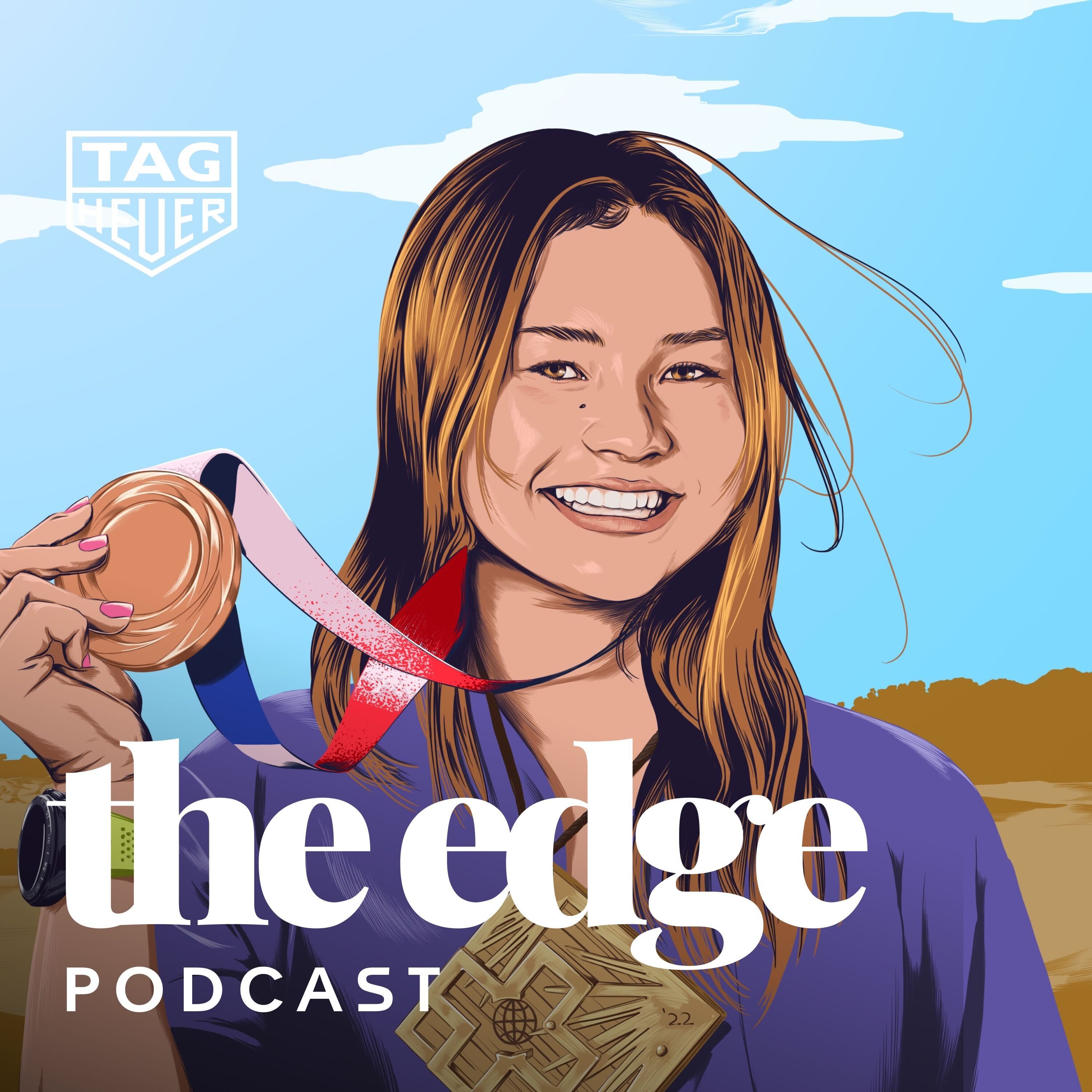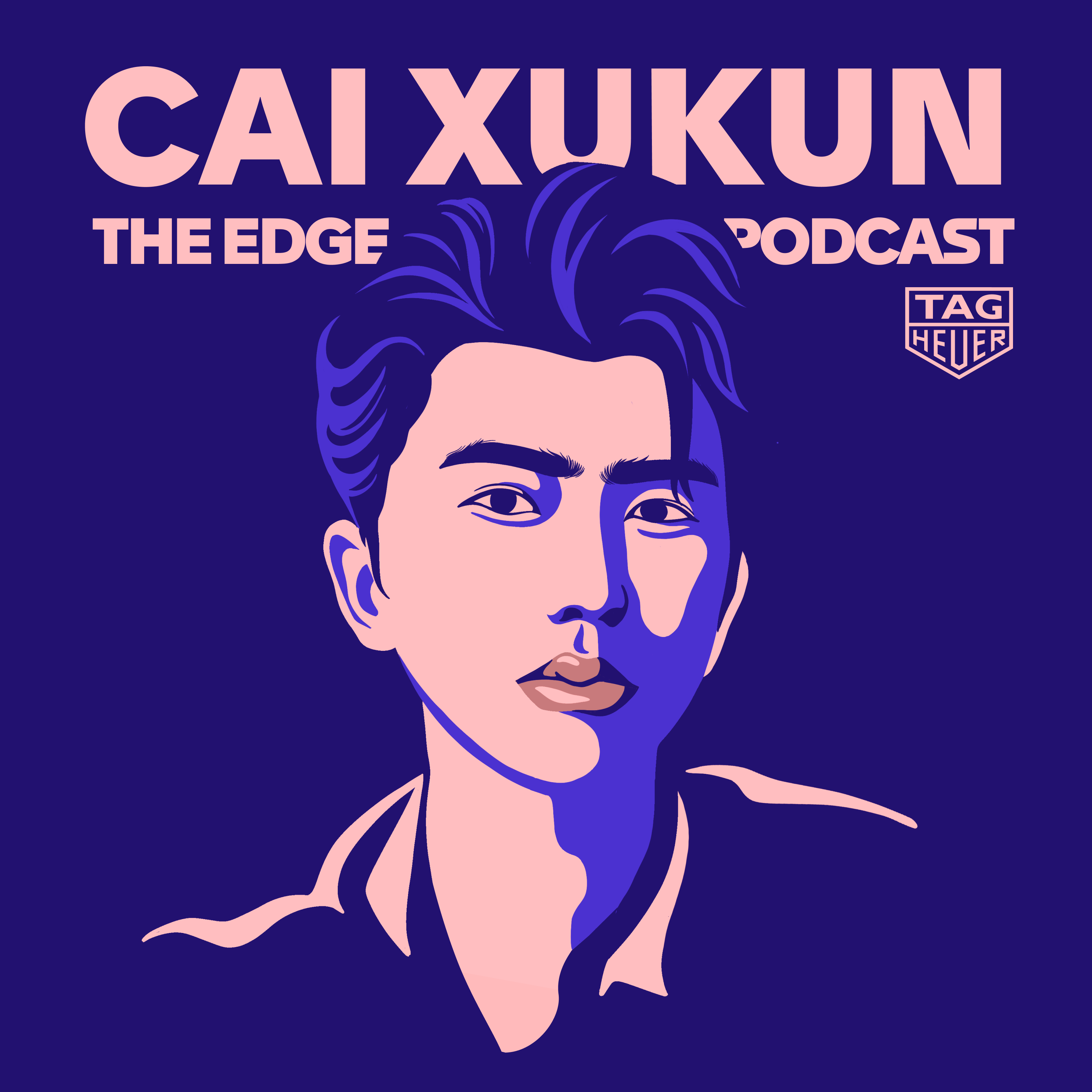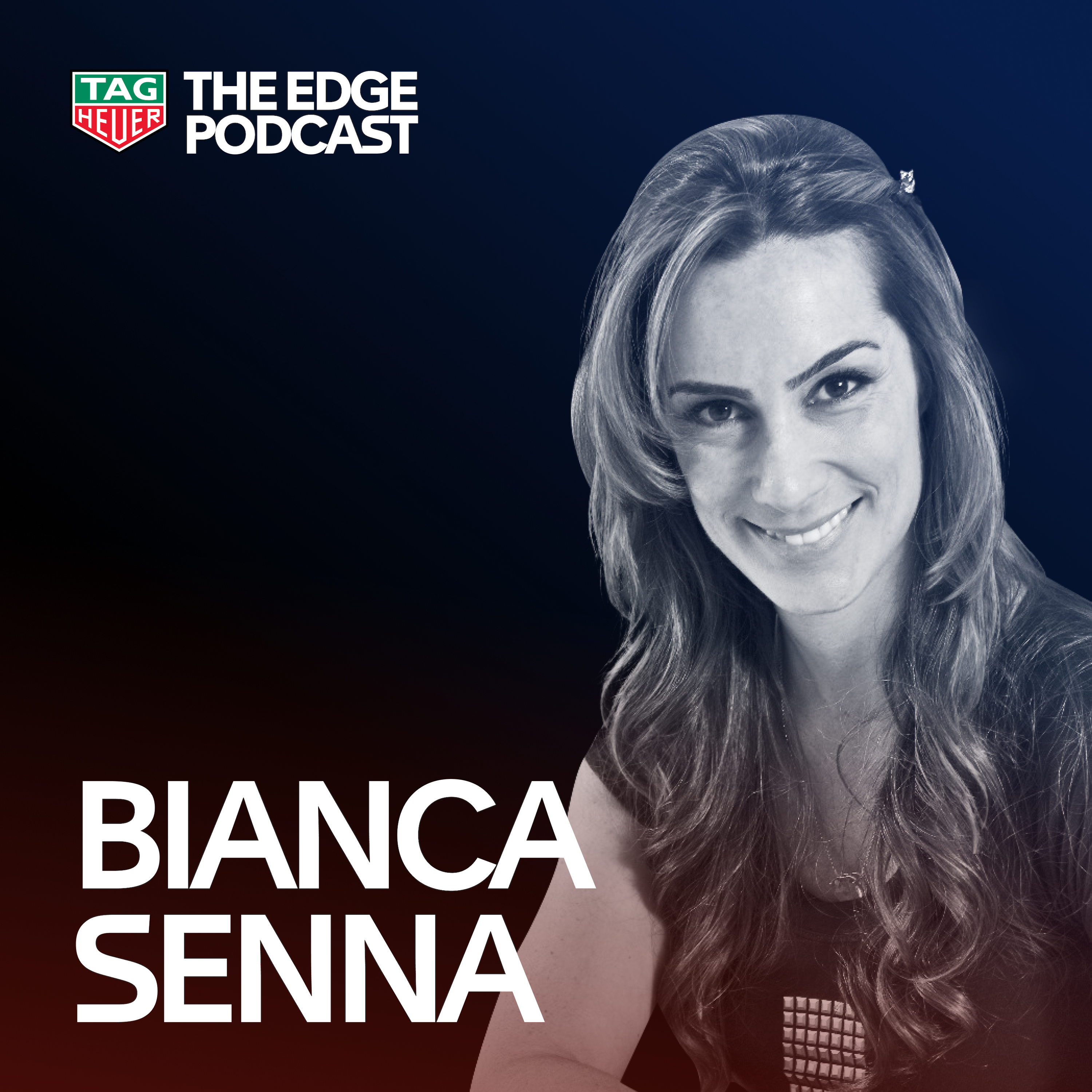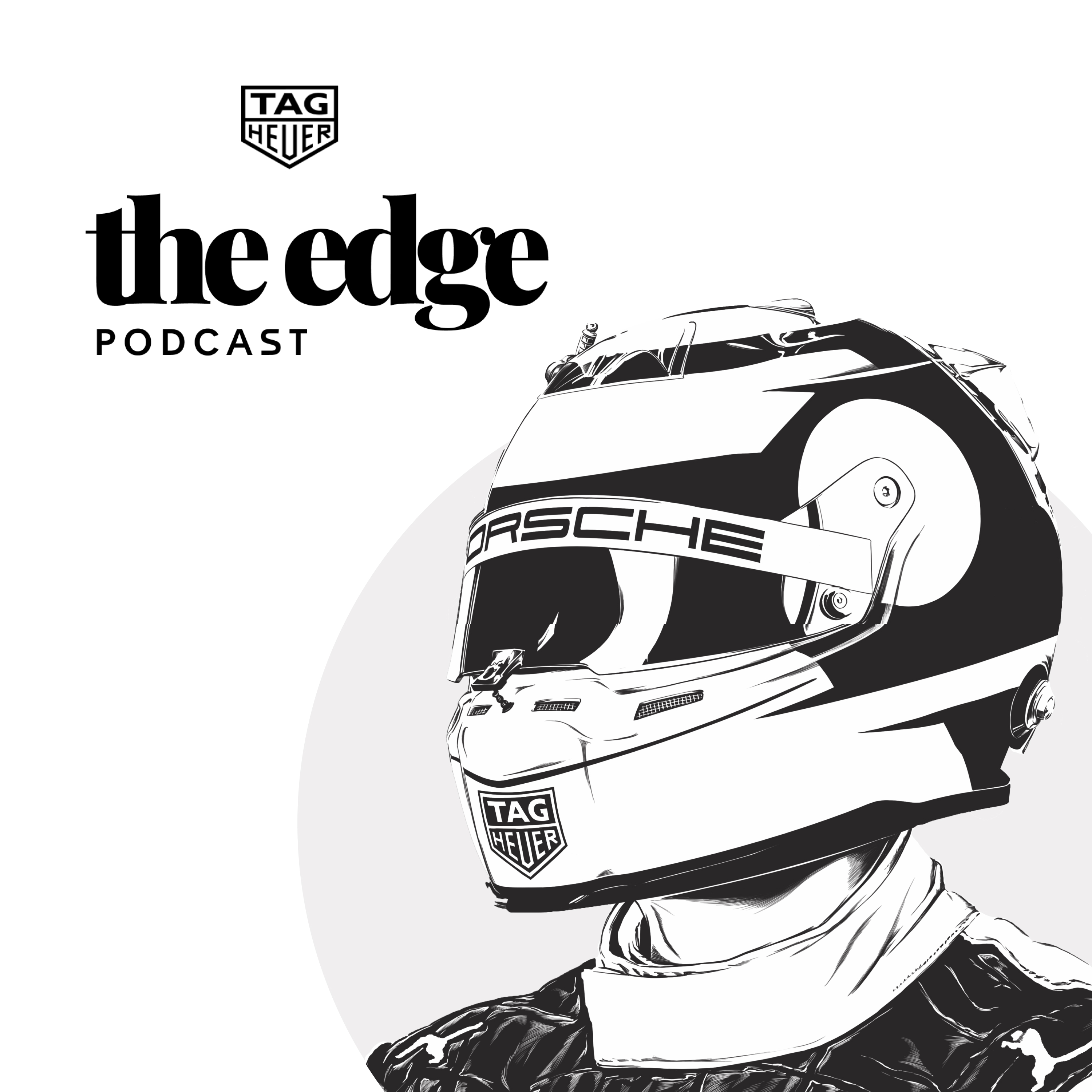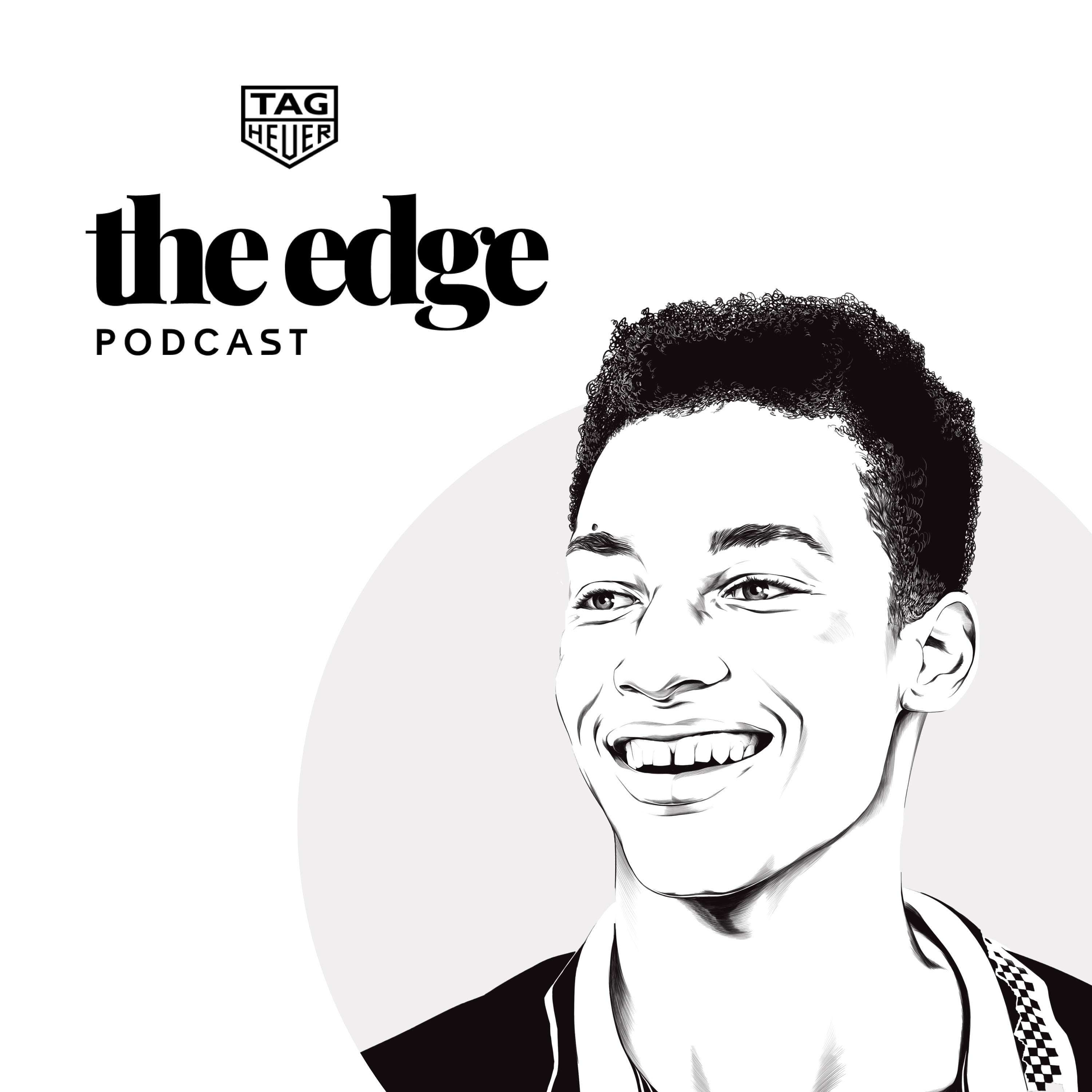Episode Transcript
Speaker 0 00:00:00 Hello, I'm Teo Van Druker. Welcome to this very special episode of the Edge, a podcast by Tag Hoya. It's the final installment of our second season. And to wrap up another exhilarating series, we thought we'd highlight some of our favorite moments with our remarkable guests. We had Sydnee, McLoughlin, and Max Waffen describing their unforgettable moments of triumph. We explored the electric world of Formula E with drivers Andre lra and Jean Erik van Race driver, Simone de Vero gave us a glimpse into what it's like to be a woman in Motorsport. Time keeping legend. Jean Campish took us back to the golden era of racing, but this season wasn't all about sport. We invited visionary Ian Rogers over for an illuminating chat about the future of Web three, crypto and NFTs to add to the wide spectrum of extraordinary guests. We spoke to actors Patrick Dempsey and Jacob Dy during the 2022 Monaco Grand Prix. And we had musician guy Berryman telling us about the time that his band Coldplay set Glastonbury a light. Each of them walked us through the moments that shaped them, the moments that pushed them to go beyond the edge. So, journey back in time with me and listen to the most inspiring moments from Season two of the Edge, A podcast by tag Hoyer.
Speaker 0 00:01:25 Let's start with the now two time formula one world champion Max First Stepin. Here he is reliving the moments that led to his first title in 2022.
Speaker 2 00:01:37 He can make a call or to pit or not for new tires and you know, we went for it. Um, and yeah, clearly that does give you an opportunity, a as long they of course, restart, um, the race. Um, and then of course they, uh, they released the cars just for one single lap to race. And I knew it was on,
Speaker 2 00:02:03 You know, we had a chance again to, uh, to fight for the title. So then it's all about just, you know, getting yourself in the right position in the restart and trying to be as close as you can be to, to have, you know, to go for the move. You know, these cars are not easy to, to follow, especially last year. Um, uh, but I did, of course I did have the, the, the fresher tires. So I was just very excited. Once, you know, of course they released us and we had that one lap fight and I got, you know, I got in front. That was what I wanted. Um, because as soon as you were in front, then it's, it was up to me to, to try and defend and, uh, that's way better than having to try and do a dive somewhere, you know, really unexpectedly at the end. So, uh, yeah,
Speaker 2 00:02:51 I think the particular moment where I started to realize it was happening was of course, after that final defense into that fast left hand corner. Cuz in that last sector afterwards, you, you cannot pass. So it was all up to me from there and we just, not to make a mistake and just drive it to the line. Um, so, uh, yeah, you just, you know it in your head, it's happening, but you still need to be, of course, focused for the last sector to <laugh> to not make a mistake and, and get too excited. Uh, suddenly it was back on and, uh, of course to then cross the line as well, you know, the, the emotions from in the beginning of the race, of course, really excited and looking forward to. Then during the race, basically it was dropping, knowing that it didn't look like it was gonna happen to then suddenly completely turn around and, you know, you won was insane, like in a time space of like one and a half hours at the time as well.
Speaker 2 00:03:43 There was so many emo like it went that quick. Of course now when you look back at it, um, you probably can appreciate it even more. Um, but yeah, at the time, like it was just insane. Uh, what, what came at me. I mean, I was, I was crying in my helmet and knee lap, um, as well, just from knowing that, you know, everything you worked for up until then, you know, you, you achieved your, your life goal in, in racing. So, um, yeah, in general that, that whole lap, um, was something. Yeah, I will, I will never forget.
Speaker 0 00:04:23 Next up we have the great Sydney McLaughlin describing in vivid detail, the moment she became the first woman in history to break the 52 second barrier in the 400 meter hurdles. It's an absolutely fascinating insight into the mind of an athlete in action over to Sydney.
Speaker 3 00:04:44 I think the atmosphere around you in terms of the fans, the crowd is always a bonus to any sort of competition like that because you kind of feed off of their, you know, their noise and their level of excitement. Um, and I think for me that day it was a lot of the times I don't notice if I'm being honest, uh, I am can kind of hear what people are saying at times and I can see faces in the crowd. But, uh, when I go into a zone of running and focusing on what it is that I'm there to do, I honestly can't even really hear anything. I think it's amazing after you finish a race and everyone's clapping and cheering and you can kind of join in the moment, but when you're running around the track, ah, your mind's in so many other places than that <laugh>
Speaker 1 00:05:34 Set.
Speaker 3 00:05:39 Looking back on that race overall during those 51 and 0.9 seconds, um, a lot was kind of happening, you know, like I said, it was the euphoric state, but I was still aware, kind of just where I was in the race, I think think through the first four or five hurdles, I felt very comfortable. I didn't feel super pressed like I was, you know, behind or anything like that where I was strenuous.
Speaker 3 00:06:13 I'm very aware, I feel like, of my competitors during the race, I think I can always sense kind of where people are, even if they're behind me, cuz I can hear them, I can hear their footsteps and you know, you can tell who in front of you is either ahead of you or behind you based upon who goes over the hurdle first. So it's always good just indication of where you are. Um, and you know, you kind of know coming off of the last turn who kind of stands where, uh, in positions of the race. And I think just coming off of, you know, going into 200 meters and coming off that turn, that was when I kind of told myself, I was like, okay, now is when you need to decide if you're gonna go or not. I felt strong, I felt confident in my steps and I was like, just go for it. Um, and then coming off of hurdle eight, I felt in a really good position to kind of just surge, which led me through nine and then ultimately through 10, where I, like I said, I was just telling myself, do not stutter. Take whatever leg comes and then just sprint to the finish.
Speaker 3 00:07:36 And I felt very strong in my form, in my, um, endurance and my capability. And most of the race went by and I wasn't even realizing it was happening until maybe the last two hurdles. And I just was like, okay, tell your, you know, I can break down hurdle by hurdle, but I just remember, you know, being very close, uh, coming off of the last turn and I just told myself, do not stutter on these last two hurdles. Whatever leg comes, just take it after you come off of 10. Just run to the finish line
Speaker 3 00:08:10 The last 50 meters. I just was so excited to cross the line and see what the clock said, you know, because there's been so many practices where you're preparing for something like that and you're, you know, um, kind of mentally in a space where you're like, if this moment comes, how are you gonna finish this race to the point where now it was happening? And I was just excited to see it unfold. I made sure when I came off of 10, I sprinted as hard as I could. And I remember looking at the clock as I was crossing the line and I was like,
Speaker 1 00:08:40 What
Speaker 3 00:08:41 Does that say? The first thing in my head after I crossed the finish line was, oh my gosh, I knew when I crossed the line, uh, that the record was broken. Um, I was just actually running that last 50 meters. Like, please say 51, please say 51 <laugh>, uh, <laugh>, you know, just cuz uh, it hadn't been done. And I think it's just been so cool to see now just how much faster we're all running, um, because that barriers been broken and I think it's gonna continue to just go down.
Speaker 1 00:09:32 Let's
Speaker 0 00:09:32 Exit the track and enter the stage. We asked actors Patrick Dempsey and Jacob Elliot about their early years. They look back at their first acting roles with fondness. I'd like to talk now a little bit about the first time you both started acting. So the first performance, if you will, that you kind of gave, um, it could be the first one from school, the first one from drama school, the first one of your kind of professional career. Um, Jacob, let's start with you. What was your first active performance? How old were you? Where was it? So soon?
Speaker 5 00:10:09 I think I was, I think I might have been 12 or 13, and I was, I played the cat in the hat in Suse called the Musical. Um, which I think to this day stance is one of my better, one of my better performances really though really it was completely uninhibited and free this teacher, I was a little bit rambunctious and, um, she was like, you have to play the cat in iCal. And I was like, absolutely not <laugh>. Um, and then my mom kind of pushed me to do it and there was singing and dancing involved, which now I would curl into a small ball and hide from. Yeah. Terrifying. Um, but I just was part of it was Okay, great. And, um, I don't think I've ever felt freer performing than, than, you know, that that performance.
Speaker 0 00:11:01 So would you never do a kind of Ryan Gossing in La la Landed?
Speaker 5 00:11:05 Oh, I'd love to. I'd love to, but it would be, it would be a massive challenge beyond anything that I can imagine. Um, can
Speaker 0 00:11:14 You describe how you felt before that performance? And, you know, when you, with that first Yeah. Instance, how did you kind of psych yourself up for it? How did you get in the zone or did you just, was it very instinctive?
Speaker 5 00:11:25 You know, I wasn't, I wasn't nervous at all. Um, I had so much, we will call it pizazz, um, <laugh> arrogance. I had so much arrogance at that age. Um, I was indestructible and, um, I was, I'm so well rehearsed and so ready and so sure of myself, um, that I really, I was really just, uh, I, I think I was, you know, in my head I was smoking cigarettes, drinking whiskey in the room, getting ready for the performance. Like, ah, let's, here we go again another night, guys. And we, I think we did two performances, you know, but in my head I was this great theater veteran <laugh>, you know, it was brilliant. Yeah, it was interesting.
Speaker 0 00:12:09 Um, Patrick mm-hmm. <affirmative> your turn. What was your first formative performance, would you say? Tell us a bit
Speaker 6 00:12:16 That, well, there were two, I was trying to think. I think it's funny you were doing the musical. I, I had, I did this summer theater camp in Northern Maine and we, it was a, an original production musical, and I was playing the Hook Tour a rabbit, and I had to sing and dance and do all of that. And I just remember being part of the, the group and it was a lot of fun. I enjoyed the total immersion in the summer where you're just, uh, waking up in the morning, dancing, singing, working on the, the plays and musicals and things like that. That was really fun. Are you, and that's where the bug really hit, I think.
Speaker 0 00:12:50 Are you into the kind of dancing and singing thing? Would you
Speaker 6 00:12:52 Do? Not anymore, no. I mean, I just finished up this musical, you know, disenchanted, which is this sequel to Enchanted, and we spent months doing this musical number and dance number, and then they cut the movie together and they're like, okay, we're not gonna use it now. <laugh> can say it doesn't advance the story. Oh, course. So it was fun to do. I really enjoyed the process, loved working with the dancers, and it would be something they'd like to do in the future. On stage, I'm not sure I have,
Speaker 0 00:13:19 Simone De Vero is one of few women in Motorsport. She talked about her highs and lows and the moment that shaped her career. Here's one of them.
Speaker 7 00:13:35 Think as a racer we're really the year that, uh, really shaped me the best was actually, I think it was Formula Atlantics, uh, I think it was in 2009 or something like that, where, um, I got, actually, I got in a team where, um, had two really good engineers and, and the team was, uh, they were really behind me, you know, and it was really the first time that kind of happened, happened to me that, you know, I, I was, let's say the lead driver in the team. I had, uh, actually Frankie Munis, who plays Malcolm in the middle, he was my teammate and he was racing. So, uh, yeah, we, we raced against each other for a few years in Formula bmw, and then we ended up being teammates and, uh, he was actually quite good at, at driving. So we had this really good team in the sense, and people behind me that, you know, really wanted me to succeed.
Speaker 7 00:14:22 And, um, and I worked really hard throughout that year with my engineer, and I really, I felt like I got the car that I needed. And we were actually, I think, um, leading the championship until the, the last race, uh, of, uh, of the season. Uh, and unfortunately I got taken out in, in Laguna Sec on the, in the last race and we finished dirt. But, uh, I think that really, that was the first time at the right people around me, and also it gave me really a lot of confidence in my ability and, and that really, I think, shaped a lot, uh, throughout my career because I was able, you know, to go into IndyCar and have the confidence to, to know that, you know, I can, I can be really competitive doing this. Yeah,
Speaker 7 00:15:02 We were not super good. I think we finished fifth or something like that, and then we went testing and we spent doing, we spent a day doing this Figure eight track, which we never really do, you know, and we were just trying so many things. And then I just found the settings that I wanted and the engineer kind of understand what I wanted. And then all of a sudden we really clicked and we went to the next race, uh, I think it was Salt Lake City, and I think we had pulled positioned by almost like half a second. You know, it was really a really big step. And we dominated that weekend. So that was just, uh, that just showed me, you know, to, to find the, the engineer getting to click, getting for him to understand what you need and me communicating to him what I needed, just clicked. And that really made a huge, huge difference. Yeah.
Speaker 7 00:15:49 Since that moment, I knew how, you know, I'm the type of driver that needs a specific car and I need to get there. You know, I'm, I'm not the type of driver who can just jump into something and be fast. It's just, you know, some people are lucky enough to, to be able to do that, but for me it's a, I really need to work a lot to, to get to where I want. But once I have that, I can be, I'm really good. And, uh, um, so yeah, that really gave me this, this opportunity in sense. Okay, that's what I'm looking for. And then I went to IndyCar, uh, had a few good races and also there, then I found another engineer. You know, we started working the same way together. And, uh, that's what happened in 2013 when we started being super competitive and we, uh, we actually finished on the podium. So, uh, yeah, it was something that, uh, I took from there, but it took a little bit of time, but then we found it again in, in 2013 in IndyCar.
Speaker 0 00:16:47 Let's shift gears from the future of Motorsport to the future of the internet. What will it take to convince people that Web Three is the way forward? Ian Rodgers chief experience offer at Ledger and Web three Visionary had a very interesting take on the subject. I guess the big challenge then is kind of convincing the market at large and the public at large. I know with saying that, you know, the next generation will be doing it automatically because it's what they'll know. But in the immediate, how do we kind of, um, how does one motivate the wider public to kind of get involved and understand better what you are doing and why it has meaning?
Speaker 8 00:17:25 My my point of view is, is that, um, I don't want to, um, I honestly don't care. Uh, I think it's inevitable. You know, I, I, you know, even at Ledger, I really feel like it's not our place at all, um, to kind of convince people of this or bring people into Web three. You know, we personally, I operate under the belief that it's inevitable and, and people will find their way here eventually, but they find their way, way here because lots of people make great applications, you know, along the way, you know, Ticketmaster has quietly, uh, delivered, you know, 5 million NFTs in, in, in the year 2022. Um, you know, and then you've got, you know, some people find their way in through things like NBA top shots, you know, Nike just released their piece. I think that many brands will bring people into this space kind of unknowingly.
Speaker 8 00:18:11 You know, Starbucks is changing the backend of their system, uh, to be blockchain based. And so, you know, look at how many people already have Starbucks cash and you know, that next like coupon or perk they receive will actually be an nft, but they don't need to call it an nft. Instagram has now launched Digital Collectibles. Um, they don't call them NFTs, they're called Digital Collectibles. Um, it's Uson phenomenon right now, but it's incredible what it, what Instagram is doing. They're launching with, with great artists like Refi Annadal, um, or Diana Sinclair has a, has one that's live right now that I bought two nights ago. A beautiful, beautiful image launched on Instagram. Um, and, you know, and, and it's a, it's a piece of art. You're talking about an artist who has, you know, sold, sold in major auction houses, um, who is now able to, instead of just post her art on Instagram and have, um, you know, and, and, and kind of have to give it away in an ad supported model for which she receives no re remuneration, um, she can go to her audience and say, you know, if you'd like to own one of my pieces, here it is.
Speaker 8 00:19:12 It's quite easy to own. Um, and, you know, and, and, you know, and that will, that's what will draw people in. You know, it's all of these, uh, you know, these use cases, you know, over time that'll draw people in. I don't think we need to convince people of it at all. You know, there's a certain type of person that'll be drawn to it early, and that's someone like me who's, I'm, I'm a nerd. I I'm a record collector. I'm, I'm, I'm always been a member of niche communities like skateboarding and punk rock. Like, I'm, I'm kind of built for this. I, I, I acknowledge that other people find their way in cuz they're fans of, you know, basketball, football, whatever. They understand kind of like trading cards and, and that sort of thing, you know, oth other people. Um, you know, I think that's where Instagram is quite interesting because you've already got, you know, critical mass of people who are following, whether it's artists or influencers or whomever, you know, there's already an ecosystem there.
Speaker 8 00:20:06 And, you know, if you think about it, like the opportunity to move from an add-on supported model to a model, which is frankly much closer to what L V M H is built around, you know, L V M H is, um, you know, one of the greatest companies on the planet, Ben, I don't know, is, is, you know, one of the wealthiest people in the world. Um, but their investment thesis is very simple. Their investment thesis is, we add operational efficiency to creativity. Okay, well, you know, that can work in the digital space as well. And if you think about what's, you know, what's possible, um, on Instagram, you know, I, I joke with my friends at Instagram, I'm like, look, your current business model is we steal people's attention and sell it to, to someone else. <laugh>, you know, now in the future, a part of your business model is going to be a value exchange between a creator and a patron.
Speaker 0 00:20:55 Mm-hmm. <affirmative>.
Speaker 8 00:20:55 Yeah. That's a beautiful thing. And it doesn't involve the word steal, right? So the, the notion that like, NFTs are a scam, and somehow Facebook and Instagram are great businesses. I don't buy it. Not, not in the slightest, you know, when, when the product is free, you are the product. What if instead you could volunteer to have a, a patron relationship with, with a creator that you love?
Speaker 0 00:21:22 Okay, time for some music. Guy Barryman is a watching car enthusiast songwriter, and bassist of Coldplay guy took us back to the moment that changed the course of his career the night his band set the stage of light at the Glastonbury Festival. Let's listen in.
Speaker 10 00:21:41 Our manager at the Times, um, and still is our manager, is a guy called Phil Harvey, who's an old school friend of Chris. You know, he, they, they were at school together. So, um, we call him our fifth member actually. He's, he's not really viewed within the band as a manager. He's, he's just kind of viewed as our kind of creative director and our fifth member. Um, and it would've been the, the news that we were given, the, the headline slot would've been given to us by, by Phil, but, but spec, I don't specifically remember the moment we were told that, um, it, it was gonna happen. I mean, of course there's always conversations going and, you know, there's always the possibility and, you know, sometimes you can request or you can put yourself forward for things like this. But really in, in Glastonbury, it's kind of decide Mi Michael really decides who gets the headline, and if he likes your band, and if, if he's decided he wants to champion your band, then he will put himself on the line and do it. And it was a big risk for him to, to put on such a young band who'd only, um, release one album onto the main headline slot in his festival.
Speaker 10 00:22:55 It's, it's so easy to, to kind of work yourself up into such a state of fear. I mean, my biggest fear sometimes is, you know, I, I I sometimes have these dreams about walking on stage and looking down at my instrument and realizing that I've completely forgotten how to play anything. You know, it's like a, it's like the ultimate anxiety dream. And so I think before we walked on stage in Glastonbury, I, I, you know, I remember just thinking, am I gonna remember how to, how to play these songs? Of course, it's completely irrational, but it's just fear kicks in and, and tells you that this might be a situation which could arise. You know, you might just not be able to remember how to play any of this. And it's a, it's a pretty awful feeling. But, you know, when the first song starts, your body just kind of kicks into, you know, we, we, we talk a lot about muscle memory when we, when we play live, which is, you get to a point where you've played songs so many times that actually you don't need to think about it anymore. Your fingers and your arms just go to the places that they're supposed to be through this kind of concept of muscle memory. So, so all of those fears quickly dispelled, you know, as soon as the first song started, and then, and then it's just head down from, you know, beginning to end to get to the end of, end of the show without any, without any mistakes.
Speaker 10 00:24:20 I remember in the set, we played a song called Clocks, which was from our second album. Um, so nobody had, nobody had heard this song. Um, and it was a song we were all immensely proud of. And, you know, we knew it was going to be a single from the second album. And, um, one of the things I remember most, in fact, the most memorable moment from that set, uh, Glasson Marine, was something which happened, which I was completely unaware of. And that was, it was the first time we had ever been given a laser to use. So from behind Will's drums, when we started playing, uh, clocks, this laser beam shot out from behind will up into the skies, like a single green, um, beam of laser. And because there's always so much haze and smoke kind of rising up from the crowds, um, at Glastonbury, you know, the laser was very visible because as it was reflecting through all this smoke, and I just thought, you know, it almost stopped me in my tracks because I was like, well, what is that?
Speaker 10 00:25:24 I wasn't expecting this kind of, it was almost like the bat, you know, like the Batman sign had been shot up into the sky. It was just this vast single laser beam, which it was just mesmerizing to look at. And then as the, as the song carried on, the laser beam opened out into a fan. Yeah. So it, it split out into many, many different laser beams, uh, and it's split out into a fan pointing straight up into the sky. And then as the song progressed, that kind of fan started dipping down over the audience. So it was just kind of going straight over the audience's head. And it was just one of the most, I think, one of the most visually impressive things I've still, I've seen to this day.
Speaker 0 00:26:08 Stop the clock for Jean Campish, the undisputed king of timekeeping. Jean was an integral part of the greatest racing teams during the iconic seventies and eighties. He took back in time to explain how Hoya changed the art of timekeeping forever.
Speaker 12 00:26:32 It was a time when timekeeping had really evolved, and we started to have monitors in the boxes for each team. But the beginning of timekeeping was painful because even if now, now there were fewer calculative errors or none at all, because we were there already working on it, there was still often technical problems. Sometimes the images on the monitors were interrupted or interfered with by radio waves, et cetera, so that all the results began vibrating on the screen. There were times when there were power failures, so timekeeping was tricky right from the start. I'd say the biggest advances were made with the help of electronics. At the end of the seventies, when Hoyer worked hard to develop a completely automated system of timekeeping, totally automatic,
Speaker 11 00:27:19 Full automatic, complete automatic,
Speaker 12 00:27:25 That meant every car was equipped with a little transponder. A transponder is a tiny transmitter, which says, I crossed a finish line at this point. And the times were measured by a timing device, which was then connected to a computer, which were, and these computers were huge. It was crazy. We were at the Neel circuit in Belgium to do a demonstration of Formula One, the Neel racetrack. I remember it very well. We had a station wagon, which was a Volvo with a car already full with all a timing material. And behind it, the caravan with the computer, the computer was a big slab measuring nearly five feet across, over three feet high and over five feet deep. It was enormous. And we had this demo in Ave, which was very convincing. The great Bernie Leston wasn't there yet. He was at a high level, but the French Motorsport Federation were there, there were officials from the International Federation, and it was something that would've been amazing for Formula One. The problem was money.
Speaker 12 00:28:43 The being tested on the navel circuit have proven that the system worked. We knew we needed to standardize this setup, but for that there had to be money. And this was at the end of the seventies, a very difficult time for the watchmaking industry because the Japanese had just entered the market with their quartz watches, very cheap watches, et cetera. This was causing some serious suffering for the Swiss watch industry. And so Hoyer had a hard time focusing on the development of stopwatches, the development of watches, and unfortunately, let the Ferrari contract go and let the timing division go, which had been developing the timekeeping devices. So sadly, you could say that the Ho Year timekeeping, a venture had come to an end at the very beginning of 1980 when Ho Year became part of the organization called Swiss Timing. Swiss Timing was an umbrella company for long Gene o Omega and Hoer. But at the time, these three brands were competitors. Nonetheless, this organization was put together, it was to protect Swiss culture and position against the Japanese and the Americans protect against companies like Secco and Citizen, et cetera. So Hoyer became part of Swiss timing, and I had the pleasure of working within the bosom of this organization during the Youth Olympics at Lake Placid during the Winter Olympics and in Moscow during the summer Olympics. Hoya's dream sadly ended there.
Speaker 0 00:30:31 Season two of the Edge had everything including a bromance formula. E drivers and best friends, Andre Lara and John Arik fan talked about their shared passion for racing coffee, photography, and Yes, watches.
Speaker 13 00:30:46 Um, what are your passions outside of racing? Passions? Passions, our passions outside racing? Um, yeah, quite a few. Um, I picked up on photography in 2016, was my dad's hobby that, um, I was the Guinea pig, uh, when, uh, when I was a kid, <laugh>, like at the Goca track. Um, but, um, I wanted to, to to, to give it a try, became a hobby. Uh, what else? I like, um, I like cars. I like collecting classic cars. Sometimes work a little bit on them. Play with my buggy. I have a, have a, a two seater buggy, so cycling a little bit and countryside, enjoy, enjoy cooking, making pizzas, coffee. So yeah, we have, we have similar passions, actually. Huh. We're very different people, but we're very, very similar passions. I mean, you spend a bit of money too, I think, uh, <laugh>, I, I don't know in what we are very different, but, uh, we're not that different, actually. I don't think so. I think we we're, we're different, but we are, we're similar at the same time. Otherwise we would be friends. No, you have to complete each other a little bit. That's lovely. So, so romantic. Yes, it is. Um, well, I, before I met, uh, Andrea, I had no passion and, and, uh, <laugh>,
Speaker 13 00:32:06 It's kind of, I mean, okay, it's not true, but kind of true. No, we, we had, we weren't clubbing. There was a bit of a passion. Yes, that, I mean, some things we can't talk about, uh, no. But, um, it's, it's true because, um, I used to like sunglasses, but Andre was a maniac about sunglasses since I met him. I bought more pair of sunglasses in the next few years than I ever did in my, all my life. Second thing was photography. Uh, my dad was a photographer and he love photography, and he always tried to teach me when I was a kid, and I never wanted to hear about it. I meet Andrea and I see him with his cool Lakers on the track, taking cool pictures, and I could see him enjoying. So I was like, Hmm, I'm gonna do the same. You know, like that's what a good team does.
Speaker 13 00:32:54 You know, we, we, we are going towards the other one and try and understand what they do to, you know, maybe, I mean, it's, it's good because when you do more things together, it, it creates bonds as well. But I didn't do it for that reason. I was like, okay. So I bought my first lake car, then a second one, then a third one, and then <laugh>. So I spent quite a bit of money there. Then, uh, coffee. I always kind of like coffee, but, uh, then I, I came at Andres and uh, you know, I was making his beautiful, uh, latte espresso with a little bit of latte art. And I was like, oh God, that's so cool. I love that machine. <laugh>. So I bought this machine and then I didn't stop there. I bought another one, and then I didn't stop there. I saw Andre had a cool vintage machine, so he gave me the same contact, and I called the guy, I said, I want something bigger than what Andrea has <laugh>. So I bought, uh, an even older machine, uh, a little bit different, but, um, <laugh>. So yeah. Um, quite a lot of, uh, similar passions. Um, watches. Watches, yes, I was talking about cars. Like this is something we are completely different. Yeah. Like this guy has no idea about cars. <laugh>. Like <laugh>. It's so funny. What did you do once on the, with your, with your company car? Oh, God. Huh? You're so mean. Why, why do you bring <laugh>? This is really bad <laugh>. So he actually refueled his diesel car with gasoline and broke down <laugh>.
Speaker 13 00:34:27 I will say that that's not true, but it is, unfortunately. Well, that makes it true from the driver, right? That's what I said. I mean, that was a funny story. The guy that came to pick me up on the side of the motorway, he picked up the car and I jump in the truck and I say, hold on a second. You're not this guy, uh, ex formula went to your van, right? And I was kind of hiding, so yeah, yeah, that's mean, that's me. And he, he told the car and he checked something quickly. I say, what, what happened to your car? And I generally didn't know what had happened, even at that point, I had no idea. And, uh, he said, uh, you sure you put the right fuel in the car? And at that moment it clicked. I say, oh my God. Of course I didn't put the right fuel. And, uh, it, it was quite embarrassing for me. But the guy died laughing and I had to find an excuse. I said, look, I'm driving Formula Electric cars, mate, so I, you know, it's not my fault. <laugh>.
Speaker 0 00:35:27 There you go. That's a wrap on season two of the Edge. Thank you for listening. If you'd like to hear more from extraordinary visionaries, athletes, or artists, stay tuned for season three, wherever you get your podcasts. And if you've enjoyed listening to us, don't forget to subscribe and leave us five stars. It does make a difference. You can also head over to the Edge, our tag Hoyer magazine to discover more stories, interviews, and news about the latest tag Hoyer time pieces. We'll drop the link in our show notes. Thank you to all our amazing guests for joining us. I'm your host, Teo Vanden, brca, and I'll be back soon with another season of the Edge, a podcast by Tag Hoya. See you soon.
